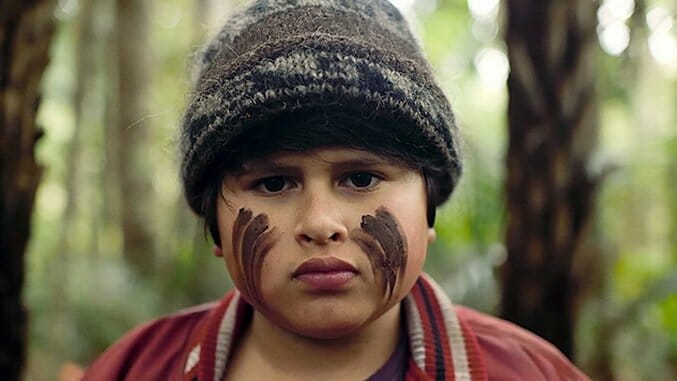Hunt for the Wilderpeople

Bella’s (Rima Te Wiata) first encounter with Ricky (Julian Dennison), the new foster child she’s agreed to take on, doesn’t inspire confidence, especially with her clumsy jokes at the expense of his weight. In turn, with child-services representative Paula (Rachel House) painting Ricky as an unruly wild child, one dreads the prospect of seeing the kid walk all over this possibly in-over-her-head mother. Not too long afterward, though—the morning after Ricky unsuccessfully tries to run away from his new home—Bella proves to be much smarter than she initially seemed: Instead of castigating him, she wears him down with kindness, beckoning him to at least come back home for breakfast before he tries to run away again. By the same token, Ricky ends up less of a tough cookie than he—with his fondness for gangsta rap and all that implies—initially tried to project, quickly showing his warmer, truer colors.
An adaptation of Barry Crump’s novel Wild Pork and Watercress, Taika Waititi’s new Hunt for the Wilderpeople thrives on upending such preconceived notions. Once Ricky and Hector, or Hec (Sam Neill)—the latter an older bushman Bella cares for before she suddenly dies—go on the run in the wilds of New Zealand after child protective services seeks to return Ricky to a care home following Bella’s passing, Paula reveals herself as more of a fanatical zealot than she let on in that first scene (“no child left behind” is her frequent motto, which she utters in the film with seemingly unthinking reflexivity). Considering TK (Troy Kingi)—the father of Kahu (Tioreore Ngatai-Melbourne), the young Maori girl Ricky meets as he tries to get help for a sick sheriff he and Hec encounter in a cabin—one initially expects him to capture Ricky himself. Instead, he’s star-struck meeting Ricky (newly anointed folk hero for being a widely sought-after fugitive) and proceeds to take selfies with him.
As for the film itself, though Waititi includes aspects that play like genre parody—a montage scored to Leonard Cohen’s interpretation of the “Song of the French Partisan” unexpectedly recalling McCabe & Mrs. Miller; a Mad Max-like chase climax; Lukasz Buda, Samuel Scott and Conrad Wedde’s 1980s-style synthesizer-laden score—Hunt for the Wilderpeople is ultimately disarming in its innocent sincerity.